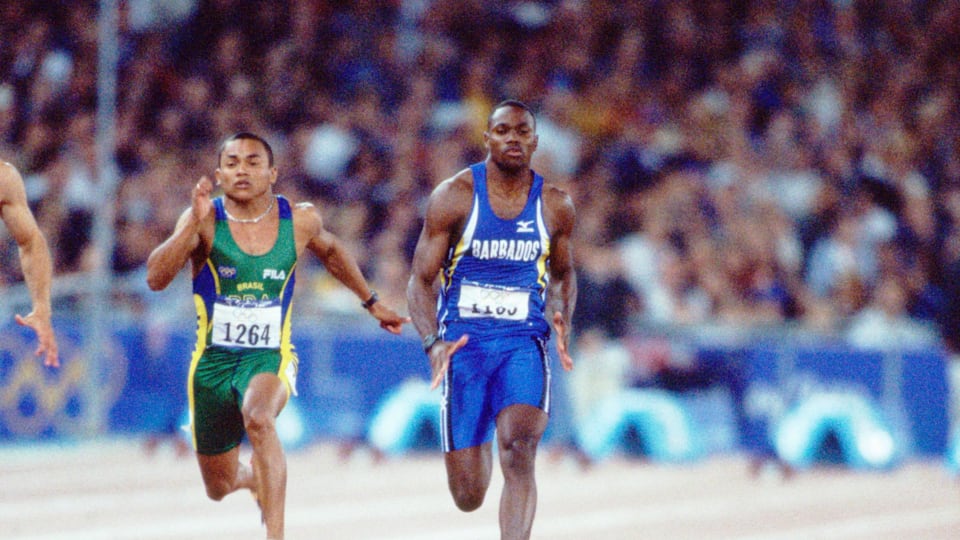Obadele Thompson soars to victory for Barbados
While winning an Olympic medal is a personal goal for thousands of athletes, for 24 nations it is a dream that has only ever come true once. Tokyo2020.org looks at the glorious moment and the impact it had on the lives of the athletes who achieved it.

The background
Barbados, a relatively small island in the West Indies, has been a part of the Olympic Games since Rome 1960 except when it chose not to participate at the Moscow 1980 Games.
However, it would take four decades before the small island nation could finally celebrate its first Olympic triumph.
Obadele Thompson would be the man who would put Barbados in the annals of Olympic history - and it all happened at Sydney 2000.
But before that historic moment, Thompson was already a champion in his own right and had already made a name for himself.
He won five gold medals at the annual Caribbean CARIFTA Games and in 1994 he had also broken the junior world record in the 100m. In 1996, he also won the NCAA (US Colleagiate NCAA) indoor 200m finishing in 20.36 - just beating American sprinter Michael Johnson's record of 20.59.
Thompson would make his Olympic debut in Atlanta 1996. And despite suffering from groin and hamstring injuries in the lead up, he would finish in an impressive fourth.
History in the making
For Thompson, the 100m final in Sydney 2000, was the night that would define his track and field career.
And with over a 100,000 people watching at Sydney's Olympic Stadium, and 11 million people tuning in on their television sets, a 22-year-old Thompson was out to prove why he's one of the best sprinters in the world.
However, Thompson hadn't come into the Games in top shape. Weeks before, he had flown to the US for treatment after injuring his big toe in a race at the Monaco Gold League where he finished second in the 100m to the USA's Maurice Greene.
Despite this, in Sydney he looked very promising. Thompson had topped his heat, and in the semi-final, he finished second (10.15 seconds) to Great Britain's Dwain Chambers (10.14 seconds).
But in the finals, Thompson had to face the best of the best including Greene, the current world record holder and double world champion, who was out to end the USA's 12-year Olympic drought in the 100m.
The starting gun went off but there was a false start so the eight sprinters had to restart - the nerves were definitely there.
On the second start, everyone ran the race of their life. Thompson kept his momentum, but at the final stretch, tried to barrel his way to the finish line.
Greene finished first place followed by Trinidad and Tobago's Ato Boldon - both clocked within the 9-second mark. Thompson finished in 10.04, giving him the bronze - Barbados' first Olympic medal.
Moreover, the Barbadian also finishedd fourth in the 200m.
Life-changing impact
After clinching bronze medal at the 100m, Thompson came home to Barbados to a hero's welcome with thousands of people lining the streets to celebrate his victory during his motorcade. He received the title of the Ambassador of Special Envoy for the youth among many other accolades given to him by the Barbados government for this contribution to sports.
"It feels really good to be back on home soil because I originally had not planned to return, but I am glad to be here," he told Reuters.
After the Sydney 2000 Games, Thompson made another appearance in Athens 2004 but due to injuries, he only finished seventh in the 100m final clocking 10.10 seconds.
Plagued by injuries his whole athletic career, Thompson retired from competition in 2009.
He went on to pursue a degree in economics and marketing and received his law degree from the University of Texas. He is now a motivational speaker and a personal performance consultant.
But sports would be forever part of his legacy and he would continue to promote Barbadian sports.
In an interview with National News at the 2019 Barbados Secondary Schools Athletic Championships he said: "Barbados - we have the athletes - it's just a matter of them getting into the right system, right support to be able to perform well regionally and internationally."
